Reviews by Marco Clementi
Italian Political Science Review/Rivista Italiana di Scienza Politica, 2021
Peer Reviewd Articles by Marco Clementi

Food and Food Security in the US Security Strategy (1987–2022)
Political Science Quarterly, 2024
This article underlines that food security is a relevant dimension of contemporary international ... more This article underlines that food security is a relevant dimension of contemporary international instability and aims to clarify the role it has played in the strategic discourse of the United States, given the country is the main food donor in the world besides being significantly involved in international crises. To this aim, the article carries a qualitative and quantitative content analysis of the nineteen National Security Strategies published between 1987 and 2022. The research compares the way the different US Administrations have theorized food security and their respective elements of continuity and discontinuity. The research results show that food security is a steadily relevant issue in US strategic discourse, although the reasons for this strategic relevance change significantly with the political color of the Administration.

Making America Grate Again: The “Italianization” of American Politics and the Future of Transatlantic Relations in the Era of Donald J. Trump
Political Science Quarterly, 2017
During the 2016 US presidential campaign, surprisingly frequent analogies were being drawn betwee... more During the 2016 US presidential campaign, surprisingly frequent analogies were being drawn between the Republican candidate, Donald J. Trump, and a couple of famous Italians – Benito Mussolini and Silvio Berlusconi. Reflecting upon what we call the " Italianization " of American politics, and mindful of what Michael Walzer once said of analogies and other symbols in the pages of PSQ, namely that they " tell us more than we can easily repeat, " we set out in this article to ask what it would mean, both for America's domestic politics and for its transatlantic alliance network, were Italian symbols to be meaningfully invoked. We argue that to the extent either of the Italian " objective correlatives " makes any sense, it is Berlusconi not Mussolini. And while we think America's system of checks and balances will render its domestic political institutions reasonably resistant to our Italian " tutorial, " we are far less sanguine when it comes to the health of the transatlantic community. At the very least, Trump as Berlusconi can be counted upon to " make America grate again, " and in so doing lead to a re-emergence of anti-Americanism in the transatlantic sphere.
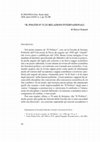
Il Politico, 2021
nel primo numero de “Il Politico”, con cui la Facoltà di ScienzePolitiche dell’Università di Pavi... more nel primo numero de “Il Politico”, con cui la Facoltà di ScienzePolitiche dell’Università di Pavia dà seguito nel 1950 agli “Annali”che aveva preso a pubblicare dal 1928, bruno leoni inaugura il suomandato di direttore specificando gli obbiettivi che la rivista si poneva.In poche pagine dal taglio più consono a un breve saggio scientificoche a un pezzo editoriale, leoni chiama la rivista all’analisi scientificadei fenomeni politici e al confronto con il mondo non scientifico. Così,mentre auspica che la rivista sappia porsi come punto di riferimentoanche all’esterno dell’accademia e sappia contribuire a risolvere i problemipiù urgenti del paese, rimanendo però “al di fuori e al di sopradegli interessi” delle fazioni politiche1, leoni analizza i rapporti fra alcunedelle discipline che concorrono alla conoscenza scientifica di ciòche è politico. In tal modo, egli teorizza ancora prima che annunciarequelli che saranno i tratti imprescindibili de “Il Politico” degli anni avenire: l’impeg...

The Guns of April: Status Anxiety as Motivation for Italian – Possibly Even American – Intervention in the First World War
Diplomacy & Statecraft, 2021
ABSTRACT Over the past several years, there has been a renewed scholarly interest in the origins,... more ABSTRACT Over the past several years, there has been a renewed scholarly interest in the origins, waging, and consequences of the First World War. This interest has resulted partly from a quirk of timing given that between 2014 and 2019, a series of centennial commemorations kept minds focused on a conflict that many take as the most consequential war the world ever experienced. On the other hand, interest has been stimulated not so much by the past as by the future of international security, with the “return” of the prospect of Great Power war beginning to concentrate minds in ways not experienced for a generation. Since much – but not all – of this renewed interest in Great Power war relates to China’s “rise” assessed through the prism of “power-transition theory”, it is natural to analogise from the events that led to 1914. In this, at least one interesting question remains relatively unexplored: are decisions to join a war already in progress prompted by a different calculus from decisions to go to war at the outset? In particular, does “status anxiety” warrant more attention as a determinant of policy-making than it has heretofore received on the part of late entrants? This analysis argues that it does and makes the case by analysing the decision of one latecomer, Italy, to join the First World War in April 1915. Although the chief focus is on Italy, the conclusion raises the possibility that status anxiety may also have been of importance in the American decision to go to war two Aprils later.
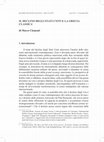
Quaderni di Scienza Politica, 2018
The issue of decline is at the core of the present and past debate on the US hegemony. This artic... more The issue of decline is at the core of the present and past debate on the US hegemony. This article aims at contributing to this debate by comparing the contemporary IR literature with the understanding the Greek historians had of the decline of Spartan and Athenian hegemonies in the classical system of the city-states. This article presents the reasons by which this comparison can be meaningful and useful. It maintains that contemporary IR theories share a materialistic view of decline, the causes of which are looked into changes of actors’ capabilities. It argues, on the contrary, the Greek historians like Herodotus, Isocrate, Xenophon and Thucydides seem to share a non-material perspective on decline. They do not search the causes for the decline of Sparta and Athens into the growth of Athens as a maritime power and, in turn, into the resulting changes in the relative distribution of capabilities. Instead, they suggest Sparta declined because it was unable to provide effective military leadership, thereby proving to be unreliable in political and military terms; while Athens declined because it became an empire, thereby proving its self-restraint was unreliable. The article concludes that classical Greece can provide useful insights on how to study contemporary dynamics. Firstly, the decline of American hegemony can result from changes in absolute and relative American power resources but also non-material factors can be autonomous causes of decline. Secondly, scholars could study the latter by focusing on the reliability of both American leadership (namely, the likelihood and features of hegemonic goods) and American self-restraint (namely, to what extent American power is perceived as threatening)
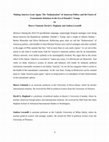
Political Science Quarterly, 2017
During the 2016 US presidential campaign, surprisingly frequent analogies were being drawn betwee... more During the 2016 US presidential campaign, surprisingly frequent analogies were being drawn between the Republican candidate, Donald J. Trump, and a couple of famous Italians – Benito Mussolini and Silvio Berlusconi. Reflecting upon what we call the " Italianization " of American politics, and mindful of what Michael Walzer once said of analogies and other symbols in the pages of PSQ, namely that they " tell us more than we can easily repeat, " we set out in this article to ask what it would mean, both for America's domestic politics and for its transatlantic alliance network, were Italian symbols to be meaningfully invoked. We argue that to the extent either of the Italian " objective correlatives " makes any sense, it is Berlusconi not Mussolini. And while we think America's system of checks and balances will render its domestic political institutions reasonably resistant to our Italian " tutorial, " we are far less sanguine when it comes to the health of the transatlantic community. At the very least, Trump as Berlusconi can be counted upon to " make America grate again, " and in so doing lead to a re-emergence of anti-Americanism in the transatlantic sphere.
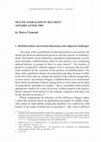
The study of the coordination of national policies is nurtured by the distinction between multila... more The study of the coordination of national policies is nurtured by the distinction between multilateral practices and the practice of multilateralism. The former can be defined as a quantitative phenomenon: according to Keohane, multilateralism refers to «the practice of co-ordinating national policies in groups of three or more states» (1) . The number of parties to cooperative solutions appears to be a necessary but not sufficient condition for the existence of the practice of multilateralism. The latter calls a qualitative feature of cooperation into play, because it refers to the form they take on, namely the quality of the relation among three or more actors. According to Ruggie, «multilateralism is an institutional form which coordinates relations among three or more states on the basis of 'generalized' principles of conduct -that is, principles which specify appropriate conduct for a class of actions, without regard to the particularistic interests of the parties or the strategic exigencies that may exist in any specific occurrence» (2) .
Chapters in Edited Volumes by Marco Clementi
Italy and World Affairs: The Sgrena-Calipari Case
Italian Politics, 2006
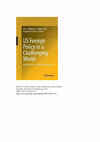
Marco Clementi, Matteo Dian, Barbara Pisciotta (Eds.), Springer International Publishing, 2017 (I... more Marco Clementi, Matteo Dian, Barbara Pisciotta (Eds.), Springer International Publishing, 2017 (ISBN: 978-3319541174).
This book examines how the US is dealing with the challenge of reconciling its global interests with regional dynamics and how it is able to produce and sustain order at the system level and within regional subsystems. The book comprises four parts, the first of which addresses global issues such as nonproliferation, trade, and freedom of the seas. US policies in these areas are carefully analyzed, considering whether and how they have been differently implemented at the regional level. The remaining parts of the book focus on the US posture toward specific regions: Europe, the Middle East, and East Asia. The policies adopted by the US to confront the most relevant challenges in each region are identified, and the ways in which policies in a specific region influence or are influenced by challenges in another region are explored.
Introduction: US Foreign Policy in Front of Global Uncertainty and Regional Fragmentation
US Foreign Policy in a Challenging World, 2017
Books by Marco Clementi
Relazioni Internazionali (Nuova Edizione)











Uploads
Reviews by Marco Clementi
Peer Reviewd Articles by Marco Clementi
Chapters in Edited Volumes by Marco Clementi
This book examines how the US is dealing with the challenge of reconciling its global interests with regional dynamics and how it is able to produce and sustain order at the system level and within regional subsystems. The book comprises four parts, the first of which addresses global issues such as nonproliferation, trade, and freedom of the seas. US policies in these areas are carefully analyzed, considering whether and how they have been differently implemented at the regional level. The remaining parts of the book focus on the US posture toward specific regions: Europe, the Middle East, and East Asia. The policies adopted by the US to confront the most relevant challenges in each region are identified, and the ways in which policies in a specific region influence or are influenced by challenges in another region are explored.
Books by Marco Clementi
This book examines how the US is dealing with the challenge of reconciling its global interests with regional dynamics and how it is able to produce and sustain order at the system level and within regional subsystems. The book comprises four parts, the first of which addresses global issues such as nonproliferation, trade, and freedom of the seas. US policies in these areas are carefully analyzed, considering whether and how they have been differently implemented at the regional level. The remaining parts of the book focus on the US posture toward specific regions: Europe, the Middle East, and East Asia. The policies adopted by the US to confront the most relevant challenges in each region are identified, and the ways in which policies in a specific region influence or are influenced by challenges in another region are explored.